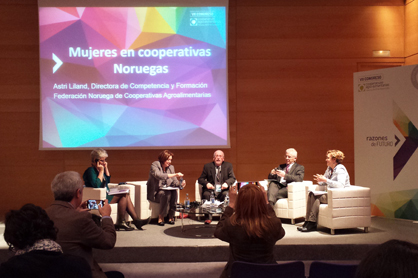More equality also in the rural area
 Esperanza Mora is the manager of the agrifood cooperative in a small village in Mallorca (Spain). She is one of the tiny 3% of women on boards in cooperatives in Spain. For that reason, she took part in the Female Entrepreneurship and Leadership Workshop, co-financed by the EEA Grants, because many things have changed but many more must change.
Esperanza Mora is the manager of the agrifood cooperative in a small village in Mallorca (Spain). She is one of the tiny 3% of women on boards in cooperatives in Spain. For that reason, she took part in the Female Entrepreneurship and Leadership Workshop, co-financed by the EEA Grants, because many things have changed but many more must change.
23.03.2015
If equality between women and men is still far from complete, in the rural area the situation is even worse. Although women have been working in farms for thousands of years, the ownerships remains in male hands, so they are underrepresented in the cooperatives decision-making bodies. Despite the fact that, as Esperanza Mora, manager of the Porreres (Mallorca) cooperative, says “many things have changed in the last 15 years”, many more still must change.
For that reason, the Spanish Secretary of State of Social Services and Equality, in cooperation with the Agrifood Cooperatives in Spain, and funds from the EEA Grants, has set up a project to promote the leadership of women in decision making bodies of agrifood cooperatives and to promote the search for new sources of employment for rural women. Within this framework, the Female Entrepreneurship and Leadership in Cooperatives Workshop was held on February in Valencia (Spain) within the VII Congress of Agrifood Cooperatives in Spain, something historic because gender equality has never been discussed in this important event.
“Women are the backbone of rural world and when the last woman leaves a village, the village closes”, pointed out Carmen Plaza, director of the Women’s Institute and for Equal Opportunities, in the opening.
Best practices exchange between Norway and Spain is one of the most important aspects of this project. Astri Liland, Head of competence and training in the Federation of Norwegian agricultural cooperatives, outlined steps toward equality between women and men, such as the Norwegian Cooperatives Law in 2007, which includes quotas so both genres were represented in governing councils.
“But we needed to train and motivate young women to stay in the farm and take the lead in the cooperatives, so we developed Ta Grep programme”, explained Liland. This programme offer training about rural activities but also in public speaking and presentations, as well as mentoring and “inspiring speeches”. The outcome is 40% of the member of cooperatives governing councils are women. Nevertheless, there are still very few female presidents.
In Spain, some cooperatives are also launching measures in order to foster work-life balance and co-responsibility, so women can have more free time for training or for participating in cooperatives, creating also new job opportunities in rural areas. For example, the project “More than a breather” in Asturias or the shepherds job database in Zamora.
What is clear is that fostering women participation, whether it be in Norway or in Spain, cooperativism and rural world wins.